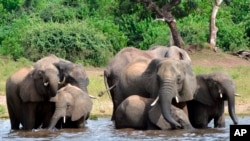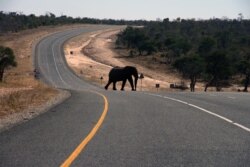For the first time in five years, elephant hunting will be legal in Botswana, with authorities planning to issue nearly 160 hunting licenses in coming weeks.
The southern African country says the elephant population has gotten too big and needs to be curbed.
In May this year, Botswana lifted a ban on elephant hunting, citing growing conflict between wildlife and humans.
The country has an elephant population of more than 130,000, more than double its official capacity.
Seventy-two licenses will be given to non-citizens and will be awarded through a bidding process for next year's hunting season, expected to begin in April.
Another 86 licenses have been reserved for locals, and are being awarded through a nationwide raffle system.
Participation in the raffle is high. Maun, a wildlife zone in the northwestern part of the country, saw 5,990 locals jostling for just eight elephant hunting licenses reserved for the area.
The government has said the licenses are not transferable, but a raffle winner, who preferred anonymity, says this makes them less attractive.
“It would have been ideal if the hunting licenses were transferable so that as a local, I can sell it to an international hunter to raise money,” said the license holder. “As it stands, the benefit is the meat and keeping the trophy."
Locals pay $800 for the license, and hunters will be accompanied by wildlife officers for the hunt.
The trophy, including the tusks, cannot be exported and should be kept by the license holder.
Despite the high interest in hunting licenses, Maun resident Boniface Keakabetswe feels the $800 fees was too steep, particularly for rural communities.
"There were raising concerns about the license price that is paid once people have won the elephant (licenses),” Keakabetswe said. “It is around P8,000 and they were saying that many people who are living in communities, who are part of the people who have applied for these licenses, are poor and many of them cannot afford the P8,000."
A farmer, Davidson Mapetla from Gobajango in eastern Botswana, where more than 250 elephants have moved into human settlements, says the allocation of hunting licenses was not balanced.
"It is a pity that there are only areas that have been identified for hunting,” Mapetla said. “The hunting licenses that have been issued, I want to tell you, it is not going to help us here. The only thing that we are going to have here is another death, another destruction of crops."
Botswana's minister of environment and natural resources, Kitso Mokaila, says the hunting season will start off "slowly and cautiously."
He says quotas were allocated in areas where there is increased conflict between humans and wildlife.
The first session of the hunting season runs between September and November.











